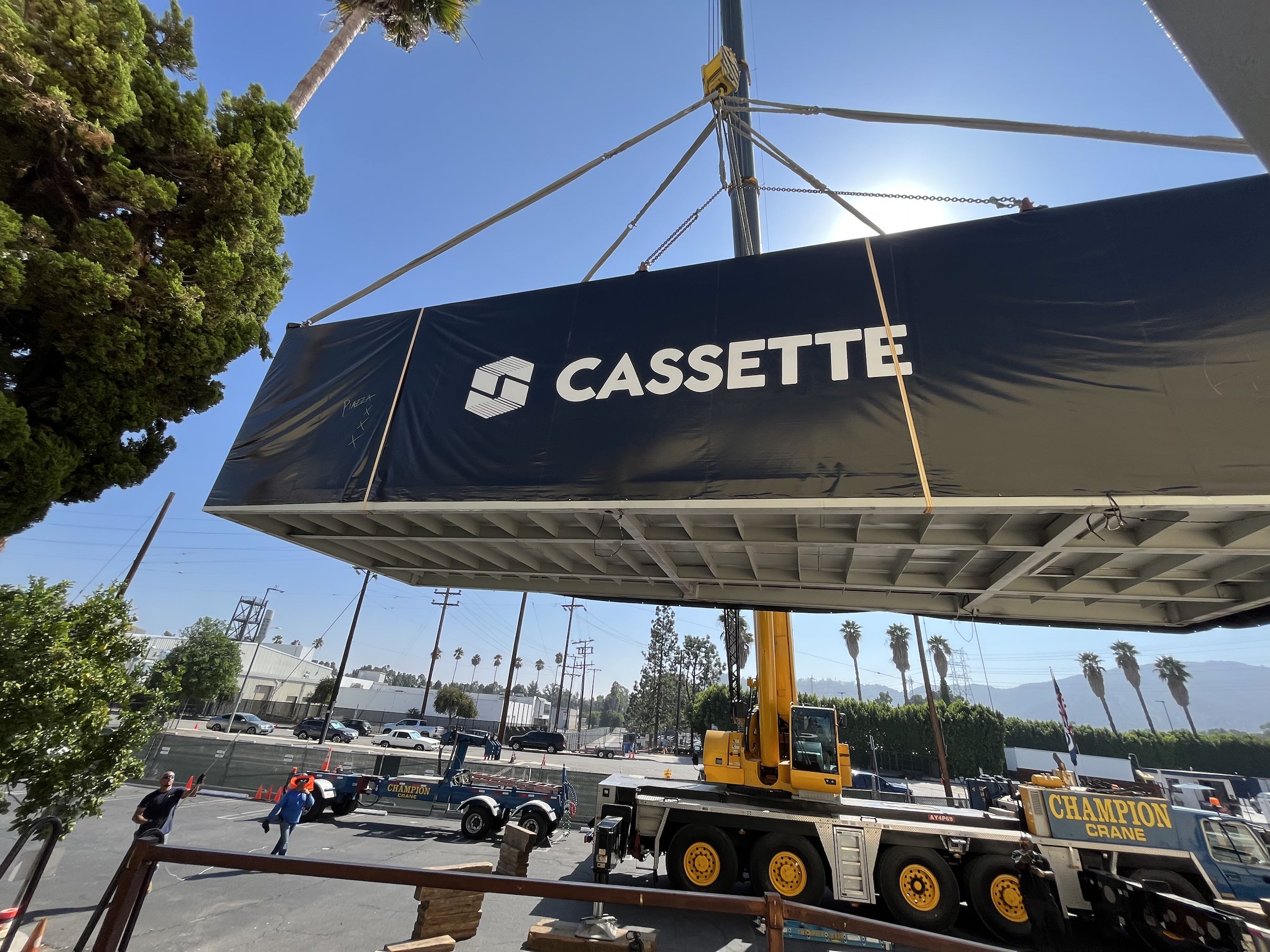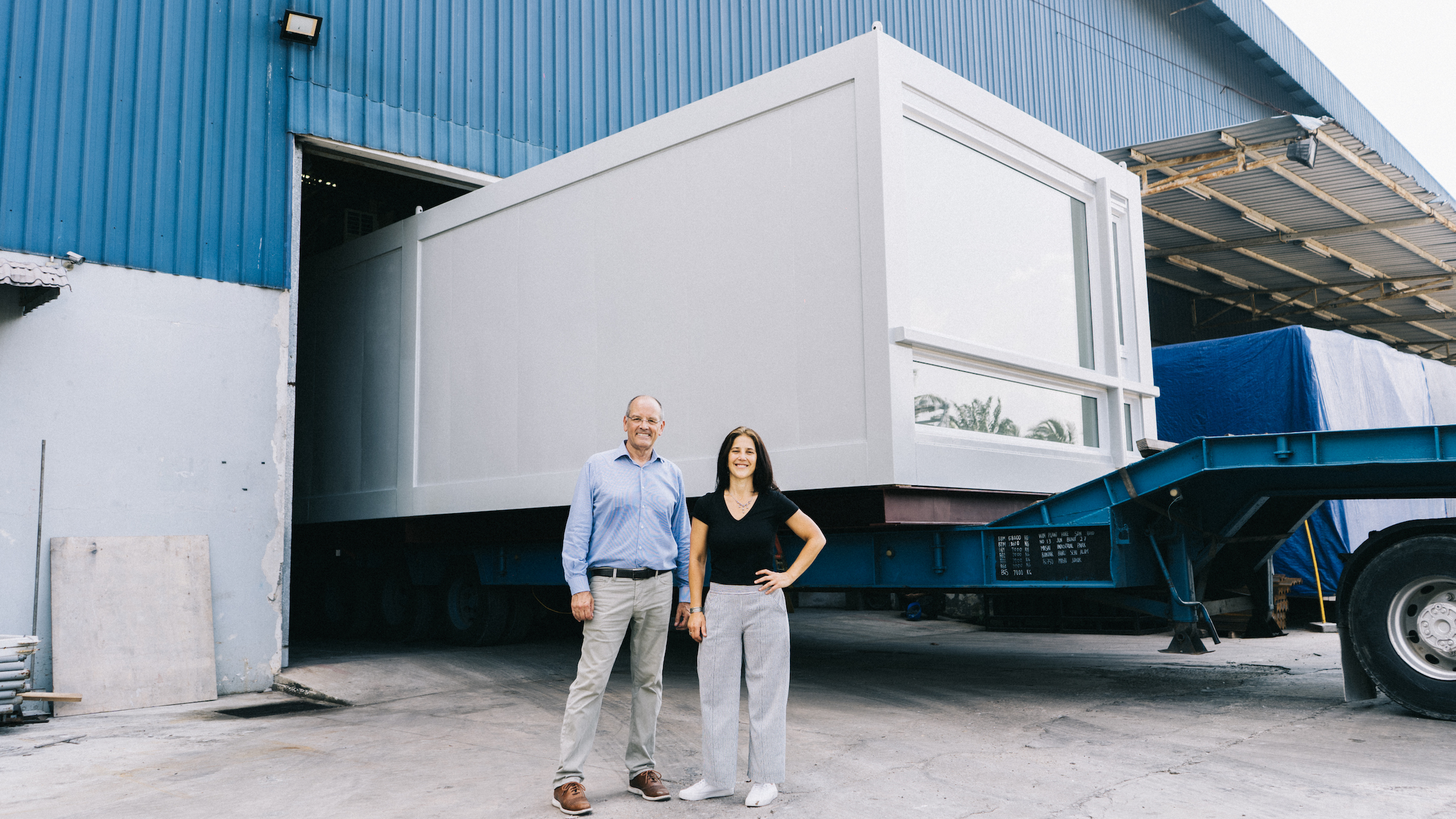Prefabricated modular design and construction have made notable inroads into such sectors as industrial, residential, hospitality and, more recently, office and healthcare. But Dafna Kaplan thinks that what’s held back the modular building industry from even greater market penetration has been suppliers’ insistence that they do everything: design, manufacture, logistics, land prep, assembly, even onsite construction. “That’s been their Achilles’ Heel.”
Kaplan is CEO and Founder of Cassette, a Los Angeles-based startup that designs and sells stackable apartment-living pods with move-in-ready 80-sf kitchens, 60-sf bathrooms, 130-sf bedrooms with double wardrobe, and 162-sf living rooms. Last October, Cassette unveiled its 600-sf, one-bedroom model unit designed by Craig Hodgetts and Ming Fung of HplusF Design Lab in Culver City, Calif., at a popup showroom open for tours.
Cassette started in 2019, but was stalled for a while by Covid-19 restrictions. During that lull, Kaplan—who previously worked in an advisory capacity with ConXTech and MATT Construction—did a lot of consulting. The Covid period also saw some high-profile modular manufacturers stumble and fall, which gave Kaplan insight into what did and didn’t work. During the year before Cassette introduced its product, Kaplan also benefited from conversations with industry leaders like RAD Urban’s Co-founder Randy Miller and FullStack Modular’s CEO Roger Krulak.
Her main takeaway from all this: “We learned not to do too much.”
Savings from modular construction come from process improvements
Proponents have long touted modular as an answer to helping lessen America’s chronic housing shortage and rising construction costs, and Kaplan is no different. Cassette’s “mission” is to reduce the cost of multifamily housing construction by 30% in three years, and double the speed of housing production. By focusing half of the building design toward a fixed product/fixed price model, Cassette would bring more predictability to construction.
“The trick to reducing construction costs is to get the entire system to function in unison,” Kaplan tells BD+C. The cost savings will come, over time, from process improvements “and getting better with every iteration.”

Hodgetts of HPlusF Design Lab, who holds two modular patents, adds that great design “doesn’t have to be expensive,” and asserts that Cassette’s formula of developing a product through a lens of manufacturing and prefab will “make modular construction a practical reality.” (The designers and Nick Butcher, Cassette's COO, knew each other previously and had worked together before. “It was a mind meld of mutual respect,” says Kaplan.)
Modular building units in production in 2023
Kaplan says that what separates Cassette from its competitors starts with price transparency. Modular suppliers are often circumspect about comparing their prices with conventional design and construction. Cassette states its pricing upfront, and while it doesn’t require minimum orders, discounts are available when customers buy more, ranging from $170,000 per unit for orders under 15 units, to $140,000 with orders of 101 to 300 units, with incremental price reductions in between.
Pricing covers predevelopment design team coordination, interior design, floor-to-ceiling window/sliding door systems, 100% preinstalled waterproofing, major appliances, tankless water heater, all fixtures and finishes, a split HVAC system evaporator coil, and onsite delivery, installation, and structural hookup.
When interviewed in November, Kaplan said her company was “in discussions” with a half-dozen general contractors. Cassette also has manufacturing contracts with factories in Malaysia and South Korea, and was in discussions with a factory in Mexico. (Kaplan notes that the supply chain, and not the logistics, is the most critical part of the modular business.) From order to delivery will take about six months, she estimates.
The 14.5x43-foot product is sized so that “you don’t need a police car on the road to transport it,” says Kaplan. The pods are stackable up to six stories and include bracket support for attaching balconies and corridors. (Sitework includes elevators and stairs, and there are extra costs for roof slope and membrane, foundations, public circulation areas, and additional exterior façade.)
Late last year, Cassette was taking orders, and Kaplan fully expects to be building projects in 2023. She didn’t reveal much, except to say that one project in Los Angeles County will be 30 units, and another 200. Cassette eventually plans to expand its assortment to include studio and two-bedroom pods. Kaplan is also keeping an eye on renter demographics to gauge future demand for different apartment sizes and features. “It’s all about good architecture and design,” she says.
Related Stories
| Aug 11, 2010
REDD and Corcoran Group Real Estate developing eco-friendly boutique condos in Brooklyn's Vinegar Hill
REDD and Corcoran Group Real Estate are developing 100 Gold, a 10-unit boutique condominium complex in Brooklyn's Vinegar Hill that consists of (6) one bedrooms, (2) duplex studios—one with a private yard, and (2) penthouses—duplex apartments with one bedroom and loft, and private terraces.
| Aug 11, 2010
AECOM, Arup, Gensler most active in commercial building design, according to BD+C's Giants 300 report
A ranking of the Top 100 Commercial Design Firms based on Building Design+Construction's 2009 Giants 300 survey. For more Giants 300 rankings, visit http://www.BDCnetwork.com/Giants
| Aug 11, 2010
Turner Building Cost Index dips nearly 4% in second quarter 2009
Turner Construction Company announced that the second quarter 2009 Turner Building Cost Index, which measures nonresidential building construction costs in the U.S., has decreased 3.35% from the first quarter 2009 and is 8.92% lower than its peak in the second quarter of 2008. The Turner Building Cost Index number for second quarter 2009 is 837.
| Aug 11, 2010
AGC unveils comprehensive plan to revive the construction industry
The Associated General Contractors of America unveiled a new plan today designed to revive the nation’s construction industry. The plan, “Build Now for the Future: A Blueprint for Economic Growth,” is designed to reverse predictions that construction activity will continue to shrink through 2010, crippling broader economic growth.
| Aug 11, 2010
PCL Construction, HITT Contracting among nation's largest commercial building contractors, according to BD+C's Giants 300 report
A ranking of the Top 50 Commercial Contractors based on Building Design+Construction's 2009 Giants 300 survey. For more Giants 300 rankings, visit http://www.BDCnetwork.com/Giants
| Aug 11, 2010
Webcor, Hunt Construction lead the way in mixed-use construction, according to BD+C's Giants 300 report
A ranking of the Top 30 Mixed-Use Contractors based on Building Design+Construction's 2009 Giants 300 survey. For more Giants 300 rankings, visit http://www.BDCnetwork.com/Giants
| Aug 11, 2010
Report: Fraud levels fall for construction industry, but companies still losing $6.4 million on average
The global construction, engineering and infrastructure industry saw a significant decline in fraud activity with companies losing an average of $6.4 million over the last three years, according to the latest edition of the Kroll Annual Global Fraud Report, released today at the Association of Corporate Counsel’s 2009 Annual Meeting in Boston. This new figure represents less than half of last year’s amount of $14.2 million.
| Aug 11, 2010
First CityCenter projects earn LEED Gold
CityCenter announced today that it has received three Leadership in Energy and Environmental Design LEED Gold certifications from the U.S. Green Building Council for: 1) ARIA Resort's hotel tower; 2) ARIA Resort's convention center and theater; 3) Vdara Hotel. ARIA and Vdara will open in December on the Las Vegas Strip and are the first of CityCenter's developments to be LEED certified.
| Aug 11, 2010
Oldcastle Precast Building Systems wins PCI 2009 Sustainable Design Award
Oldcastle Precast Building Systems was part of the award winning team behind the affordable housing development Melrose Commons Site 5 situated in the South Bronx. PCI (Precast Concrete Institute) recently selected Melrose 5 for the “2009 PCI Design Award for Best Sustainable Project”.







